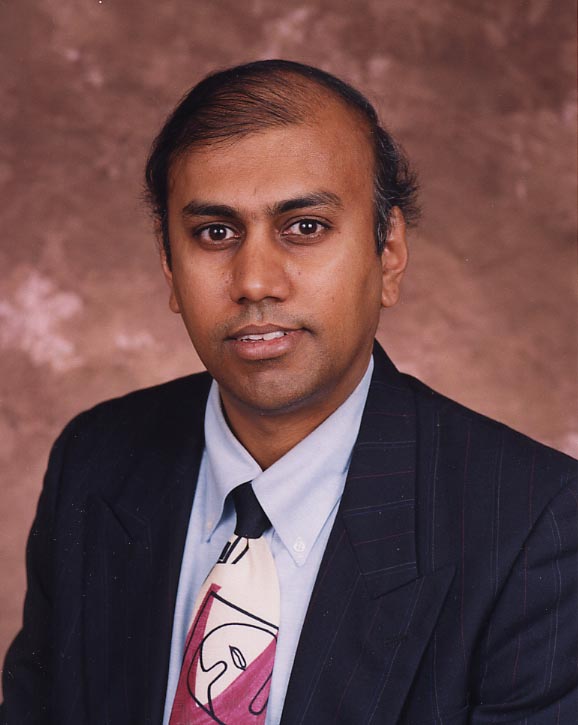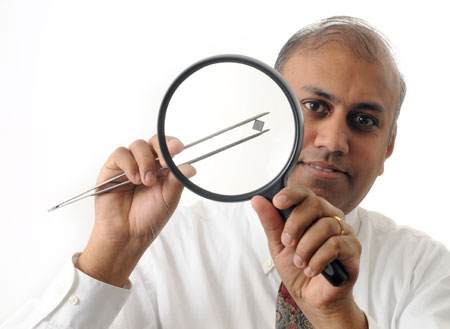Dr. Jagannathan Sarangapani
Dr. Jagannathan Sarangapani
Professor at Missouri University of Science and Technology - developed ‘brain’ for robots
 Dr. Jagannathan Sarangapani, an Indian-origin Professor at Missouri University in US has developed what could serve as brain to Autonomous machines reducing their dependence on Human.
Dr. Jagannathan Sarangapani, an Indian-origin Professor at Missouri University in US has developed what could serve as brain to Autonomous machines reducing their dependence on Human.
The System would allow robots to operate with minimal supervision something analogous to human thinking, learning and adaptation.
Dr. Jagannathan is at present a Rutledge-Emerson Distinguished Professor at Missouri University of Science and Technology (former University of Missouri-Rolla).
Technically it is a feedback system that makes use of current formation moving robots and introduces a fault-tolerant control design to improve the probability of completing a set task.
The new feedback system will allow a “follower” robot to take over as the “leader” robot if the original leader has a system or mechanical failure. In a leader/follower formation, the lead robot is controlled through a nonholonomic system, meaning that the trajectory is set in advance, and the followers are tracing the same pattern that the leader takes by using sonar.
When a problem occurs and roles need to change to continue, the fault tolerant control system comes into use.
It uses reinforcement learning and active critique, both inspired by behaviourist psychology to show how machines act in environments to maximise work rate, to help the new, unmanned robot to estimate its new course.
Without this, the follower wouldn’t have a path to follow and the task would fail.
“Imagine you have one operator in an office controlling 10 bulldozers remotely,” said Sarangapani, the William A Rutledge – Emerson Electric Company’s distinguished professor in Electrical Engineering at S&T.
“In the event that the lead one suffers a mechanical problem, this hardware allows the work to continue,” said Sarangapani.
The innovative research can be applied to robotic security surveillance, mining and even aerial manoeuvring.
Sarangapani believes that the research is most important for aerial vehicles. When a helicopter is in flight, faults can now be detected and accommodated.
 This means that instead of a catastrophic failure resulting in a potentially fatal crash, the system can allow for a better chance for an emergency landing instead.
This means that instead of a catastrophic failure resulting in a potentially fatal crash, the system can allow for a better chance for an emergency landing instead.
The fault tolerance would notice a problem and essentially shut down that malfunctioning part while maintaining slight control of the overall vehicle.
“The end goal is to push robotics to the next level,” said Sarangapani.
“I want robots to think for themselves, to learn, adapt and use active critique to work unsupervised. A self-aware robot will eventually be here, it is just a matter of time, he said.
Dr. Jagannathan received his BE in Electrical Engineering from Anna University (Chennai) in 1986. He was University Gold Medallist (1982-86) as well as National Merit Scholar (1982-86). He was also Recipient of Papu Subbarao Medal for the best machine design (May 1986).
Dr. Jagannathan has co-authored around 109 peer reviewed journal articles many in various IEEE Transactions with his students, over 200 refereed IEEE conference articles, several book chapters and three books.
He holds 20 US patents and his funding is in excess of $13 Million. His research interests include adaptive and neural network control, networked control systems and sensor networks, prognostics, and autonomous systems/robotics. He is serving as the co-editor for the IET Book series on Control.
He received the NSF Career award, Caterpillar Research Excellence Award, Boeing Pride Achievement Award and many others. He served on the editorial board of many IEEE Transactions. He is currently serving on a number of IEEE Conference Organizing Committees.
*************




